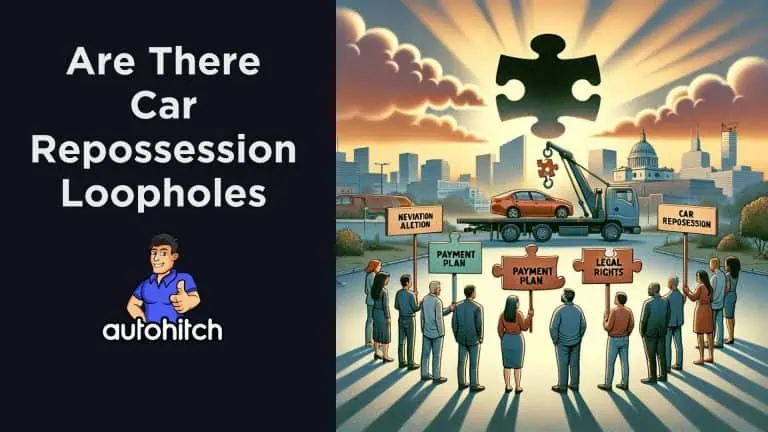Maybe your car is at risk of being repossessed, or maybe it already has been, you’re first thought is probably if there are any repossession loopholes that you could take advantage of to keep your car or get it back.
The good news is that you do have rights during the repossession process, and there are potential solutions depending on your specific circumstances.
Table of Contents
Relevant Articles to Read:
- What Happens If You Hide Your Car From Repossession
- How Long Does a Voluntary Repo Stay on Your Credit
- How to Get Your Car Back After Repossession
- How Much Are Repossession Fees
- The Complete Guide to Car Repossession
When Can My Car Legally Be Repossessed?
Your lender can legally repossess your car once you default on your auto loan, which usually occurs when you are one month behind on payments. However, state laws dictate exact repossession rules and timeline specifics.
In some states, the lender must provide written notice before repossession. But in others, vehicles can be taken without warning. Always check your local regulations.
What Repossession Practices Are Illegal?
While lenders have broad authority to seize your car for non-payment, some repossession tactics violate state and federal regulations:
- Breaking and entering private property without a court order
- Using threats, harassment, or physical force
- Committing “breach of peace”
- Taking personal property left inside the vehicle
Read: 25 Things Repo Man Can or Can’t Do To Get Your Car
Can Bankruptcy Stop Car Repossession

Yes, bankruptcy can stop car repossession; however, it might only be temporary.
The way it works is that once you file for bankruptcy (either Chapter 7 or Chapter 13), an automatic “Stay” goes into effect.
Chapter 7 To Stop Repossession
In Chapter 7, you’ll get a short window of time to negotiate new loan terms or redeem your original terms by catching up on your payments. However, the lender can fight this and ask the court to lift the stay.
Chapter 13 To Stop Repossession
In Chapter 13, you can actually get your car back if it was recently repoed. You can do this by catching up on your payments through an agreed-upon payment plan before the court that visually spans 3-5 years.
The catch with Chapter 13 is that you will have payment plans also made with your other creditors and the court will require that you demonstrate the ability to make all your payments each month.
If you cannot do that, the court will allow the lender to repossess the car or keep it if they already have it in their possession.
Can I Get My Car Back After Repossession?
In some cases, yes. Here are potential options for repossession loopholes and car redemption:
1. Make Up the Missed Payments
Contact your lender immediately and ask if catching up on late payments can stop repossession. Success depends on state law grace periods and lender policies around defaults.
2. Refinance or Modify The Auto Loan
Renegotiating your loan terms through refinancing or modification may lower payments. But you often need sufficient income and credit score, so this path isn’t guaranteed.
3. Pay Off Loan Fully via Redemption Rights
Each state grants borrowers a redemption window – typically 10-15 days – where you can reclaim your car by repaying the entire loan balance plus all repossession/storage fees. This is costly but completely reinstates your loan.
4. File For Chapter 7 or Chapter 13 Bankruptcy
Declaring bankruptcy triggers an “automatic stay,” halting collections and repossessions while debt is restructured or erased. But bankruptcy severely damages credit for years. Consult an attorney before pursuing this nuclear option.
5. Voluntarily Surrender the Vehicle
Simply giving the lender back your car saves them repossession costs. In exchange, some may agree to waive deficiency balances or fees. Get an offer for voluntary surrender in writing first.
6. Sue For Wrongful Repossession
If you prove the lender violated regulations – like using physical intimidation – you may recoup civil penalties or regain car ownership. An attorney can best advise if you have a case.
Key Legal Protections All Borrowers Have
Even in delinquency, laws grant you important rights, including:
- Advance written notice before repossession (in most states)
- Notice about personal belongings left in the car
- Notice about sale/auction after repossession
- Ability to “cure default” by catching up payments
- Redemption period to reclaim vehicle
- Assurance of safe, lawful repossession process
- No harassment/intimidation from repo agents
- Entitlement to “commercially reasonable” sale price
States that Require Notice Before Repossession
- Maryland: Depending on the contract, the titleholder may need to issue a discretionary notice at least ten days before repossessing the vehicle.
- South Dakota: The creditor may be required to send a notice before repossessing or selling the vehicle, depending on the individual contract.
- Tennessee: The contract details determine when repossession can occur and if a notice is required.
- Maine and Wisconsin: Creditors must send a “right to cure” notice and wait a specified period (15 days for Wisconsin) before proceeding with repossession.
It’s important to note that these requirements can vary significantly based on the contract terms and state laws.
In some cases, if you’ve been late on payments within the last year and have already received a “right to cure” notice, the lender may not need to send additional notices for future late payments before proceeding with repossession.
Do I Still Owe Money After Repossession?
Yes, repossession does not erase your loan obligation. If your car gets sold at auction for less than you owe, which is common, you must continue paying the “deficiency balance” left over.
This remaining debt can significantly damage your credit score if left unpaid.
What Repossession Loopholes Should I Avoid?
While struggling borrowers understandably research shady ways to keep their car, tactics like hiding the vehicle or disabling GPS trackers often backfire legally:
- Hiding Car: A court order still grants seizure access. At best, it delays repossession a few months.
- Removing GPS Tracking: Tampering with trackers violates loan contracts. You may face charges and make the situation worse.
- Lying About Selling the Car: False owner claims constitute fraud. You remain liable plus risk legal consequences.
- Ignoring Lender Communication: Dodging calls or letters won’t make problems disappear. Staying engaged with your lender is critical.
The only path to truly avoiding repossession is actively working with your lender to catch up on payments or modify loan terms. While surrendering a car isn’t ideal, it also resolves default legally if no other options exist.
Key Takeaways
- You maintain important consumer rights and protections against harassment even in delinquency
- Options like loan modifications, refinancing, catching up payments, or surrendering the car voluntarily may avoid repossession
- Redemption rights grant a brief window to reclaim your car by repaying the full loan balance
- Damages from wrongful repossession or hiding assets can be worse than surrendering the car properly



